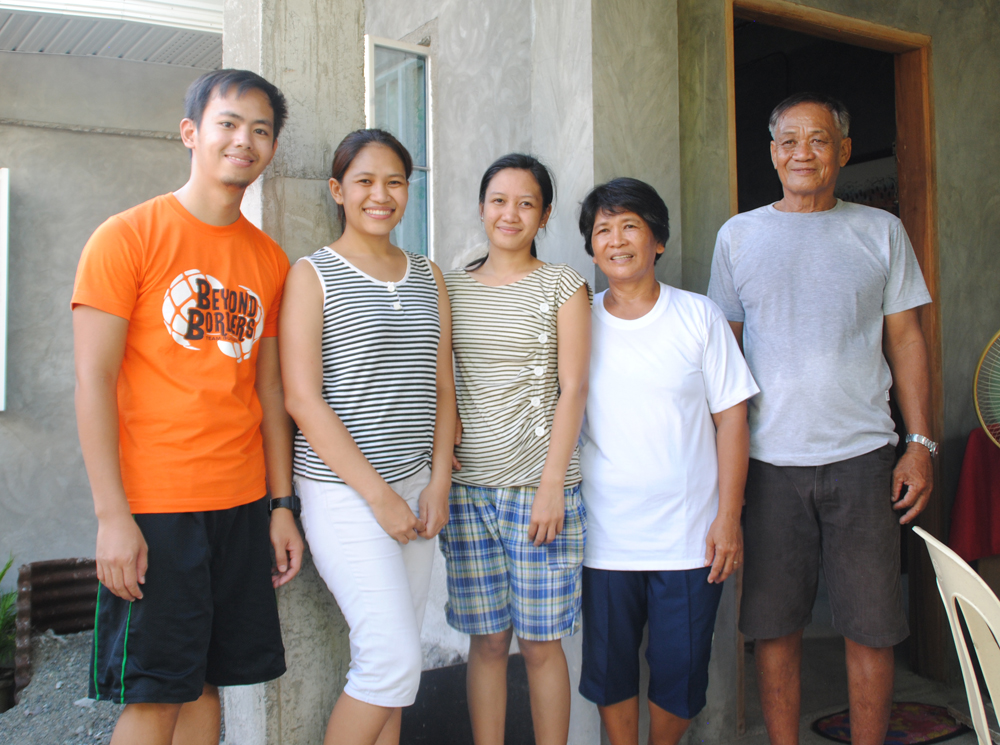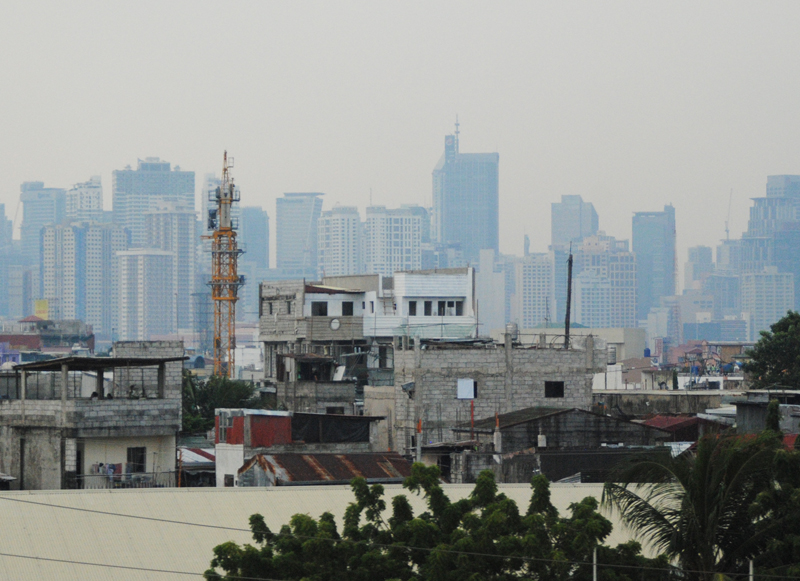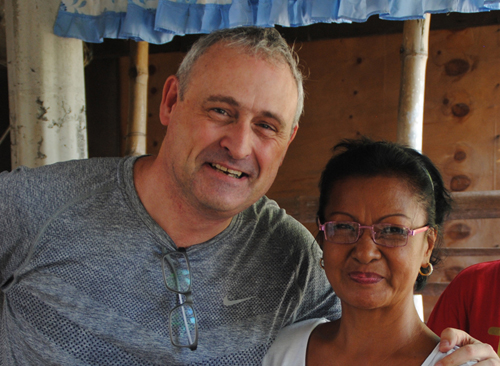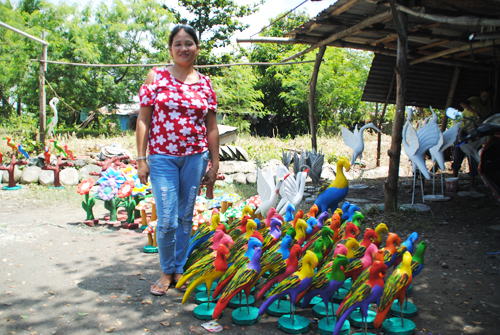
In the first of a series looking at the work of Christian microfinance organisation Opportunity International Australia and its partner agency ASKI in The Philippines, DAVID ADAMS reports on how small loans are changing lives…
It was a loan to buy a pig that started it all. But before that, life for Amina Mendez Acosta and her family was a struggle.
Based in San Jose, not far from Cabanatuan City on the island of Luzon in The Philippines, Amina, now 25-years-old and recently married, remembers her father Bienvenido working long hours as a tricycle driver while her mother Remy did whatever jobs she could to help feed the family of four, including gleaning the last remaining rice off the plants in the wake of the harvesters.
They had no savings, the concept of insurance was unheard of and any extra money the family might need due to an unforeseen situation had to come from local money lenders with high interest rates.
Now 25-years-old and recently married, Amina remembers having “unanswered questions “ about why her fellow classmates in high school had further education opportunities that she didn’t. “There was even a time when I asked myself, ‘Why would God put dreams in my heart that would not give a…path to go for?’”
Amina also remembers no-one ever having any time for conversation thanks to the heavy workloads – “Everyone was just too tired” – and the general feeling of “hopelessness” that pervaded the family. “The only hope was my sister and I graduating [from highschool] – it put a lot of pressure on us but at the same time there was this desire to make things different.”
Then, about 15 years ago, a microfinance and development organisation known as ASKI came to the community and offered small loans to people to help lift them out of poverty. Her mother was one of the recipients, taking out a loan to buy a pig.

IMPROVED LIVES: Amina Mendez-Acosta (second from left) and her family – from left, her husband Gran, sister Rina, mother Remy and father Bienvenido. ALL PICTURES: David Adams
Amina describes the changes which have occurred since in her family as “very dramatic”. As well as being able to make substantial improvements to their home (including replacing a leaky roof with a new one), her father now farms his own land instead of other people’s and last year bought a cow. “Now we’re in a position to give rather than a position to receive,” Amina says.
The relationship with ASKI also brought Amina into contact – via partner agency Opportunity International Australia – with a US couple who saw her potential and decided to provide her with a scholarship to the University of the Philippines.
There, she did an undergraduate degree in mathemathics and during her third year, had the opportunity to go to Ohio Wesleyan University in the US city of Delaware where she finished ‘Summa cum Laude’.
Following the completion of her study, Amina returned to The Philippines and took up a role with ASKI, determined to make a different in communities just like the one she grew up in. But, opportunity has beckoned once again, and to further her skills, she has now taken study leave and, having won a scholarship, is returning to the US to do a masters in global human development at Georgetown University in Washington, DC.
“I really believe in financial inclusion, I really believe in microfinance, in the way that it extends opportunities like credit, education, savings to families that are poor like mine,” she says. “And I think that’s really the way forward. I want to help in whatever capacity I can.”
The story of Amina and her family is just one of tens of thousands that ASKI and Opportunity have been part of in The Philippines.
Formally known as the Alalay sa Kaunlaran Inc, ASKI, which is headquartered in Cabanatuan City about 100 kilometres north of Manila, is one of nine partner agencies Opportunity, an international microfinance and development organisation whose origins go back to the 1970s when Australian David Bussau first started administering loans, works with in The Philippines.

A LAND OF CONTRAST: About a quarter of the nation’s 100 million people are living in poverty. A scene in Manila.
Thanks to the support of Opportunity – which has been working with partner organisations in The Philippines since 1981 and with ASKI since 1987 – it supports more than 100,000 micro-entrepreneurs with small loans, giving them a helping hand to lift them out of poverty.
The concept is simple enough – recipients are granted small loans – they typically start at about 5,000 Philippines pesos (about $AUS120) – to help them find alternative sources of income, whether it be starting a new microenterprise or expanding an existing one. There are also loans to help those living in poverty do things like upgrade their accommodation, meet immediate health or medical needs or put in better sanitation facilities, like a toilet.
While there are locally-based money lenders from whom cash can be sought in time of need, interest rates can be exorbitant and terms harsh if people fail to repay them on time. Loans granted through organisations like ASKI, on the other hand, are both more affordable and come with the possibility of being restructured should something go wrong for the recipient during the repayment cycle.
Mark Daniels, Opportunity International Australia’s country director for The Philippines, says that – with about a quarter of The Philippines’ 100 million people classed as living in poverty – the massive inequality between the rich and poor in the country is a big issue with wealth concentrated in the hands of a few.
“It doesn’t trickle down – not to the clients that we’re serving – even though the economy is a tiger in Asia…” he says. “It’s a really tough situation for the poor.”
Mr Daniels adds the issue of poverty in The Philippines is exacerbated by number of natural disasters its inhabitants face with the island nation one of the most impacted due to climate change. This means institutions need to be able to go into relief mode when needed.
“We want to be there for our clients so when there is a calamity, we need to provide emergency funding or institute restructuring of loans until they’re back on their feet again.”

Mark Daniels with an ASKI client.
“We just don’t want to do microfinance transactions. What is important is the transformational impact of the loan. The loan is important but it’s the non-financial services that are just as important to help someone climb out of poverty. So microfinance is just one tool in the toolbox. It’s a good tool, but you absolutely need a whole range of interventions.”
– Mark Daniels, Philippines country director for Opportunity International Australia.
Mr Daniels says that microfinance transactions are just one part of Opportunity’s approach to addressing issues around poverty and its partner agencies on the ground like ASKI are chosen because of their ability to reflect that.
“We just don’t want to do microfinance transactions,” he says. “What is important is the transformational impact of the loan. The loan is important but it’s the non-financial services that are just as important to help someone climb out of poverty. So microfinance is just one tool in the toolbox. It’s a good tool, but you absolutely need a whole range of interventions.
ASKI – which Mr Daniels says is a “really community-orientated, participatory development organisation” – describes itself as a ‘beyond credit’ organisation.
“So they have…a marketing cooperative to help market goods into high value markets, there’s an insurance program, there’s a community development arm, there’s a foundation arm, they have schools for slum kids – it’s that wholistic perspective that we are looking at…to add value and to change lives,” Mr Daniels says.
He adds that’s it the role of Opportunity to help equip them.
“Development is about equipping local leaders, developing local leaders, in their communities. We’re here to build ‘bench strength’ in those organisations.”

TURNING GARDEN ORNAMENTS INTO A SUSTAINABLE FUTURE
Row-upon-row of cement garden ornaments – everything from birds to gnomes, frogs to flowers – sit outside Rosita Ecal’s home in a rural area only a few kilometres south of Cabanatuan City.
Some have already been painted in bright, cheery colours; others yet await the deft hand of a painter. At the back of the house, two men sit knocking the rough edges off figurines as they are pulled out of moulds.
The scene of activity is a testament to Ms Ecal’s hard work but also thanks to a 5,000 peso loan she obtained from ASKI in 2011. Using that money, the 33-year-old, who previously worked as a landscape gardener, has started a garden ornaments business which has been so successful – her business is now turning out hundreds of ornaments a day – she has had to push up the loan amount to 100,000 pesos to meet customer demand.
Ms Ecal, a high school graduate, now employs four people and has been able to buy vehicles for delivering the ornaments to nurseries in nearby provinces and even helped one of her workers establish their own, similar business.
It’s success has also meant that she and her husband Severino are now well on their way to achieving their dreams – building a new house for her family (a project now in the planning) – and having their two daughters, aged 14 and four, finish their schooling.
Speaking through a translator, Ms Ecal characterises her life before the loan as one of struggle. “She was not able to provide all the needs that her children [had]…” the translator says. “[But] now she is…able to provide everything that they needed…Now she has the means.”
Meanwhile, the ideas for this entrepreneur keep coming – Ms Ecal says she has plans to expand into making pots for plants next.
And for all those working in the field, Mr Daniels says a story like Amina’s represents “everything that is good about development [and] microfinance”.
“You basically want to find good people and invest in them as a development organisation, that’s pretty much the bottom line…” he says. “Not all people are going to be game-changers – [Amina] is…The joy of giving to that family is just immense.”
Amina, meanwhile, says her journey has helped her gain a greater understanding of grace.
“I have seen it in my life…coming from a very poor family and having been given the opportunity to go to one of the finest universities in The Philippines…” she says, adding that, because of her background, when a campus missionary shared her Christian faith with her during her first year at the University of the Philippines, “I understood what she was talking about”.
“There was…the concept of an undeserved gift from people who you do not really know personally…So I guess the definition of grace was already there and my heart was ready to receive God’s story of salvation…”
Her relationship with Christ, she says, is the reason why, after her studies, she plans to continue to invest her life to help lift others out of poverty.
“There is a poverty of material things – where you don’t know where your next food or your dinner is coming from. But there is also a deeper poverty which is the poverty of the spirit…where you don’t have dreams or you don’t have hope for your future. And I believe that the story of Christ and salvation and grace itself, really comes to that getting people out of that poverty of spirit.”
Amina says that while she’s grateful for the way in which her life has been changed, its that relationship she has with Christ that really gives her hope for the future.
“It’s not about success, it’s about significance, and so many millennials can dream of success and all its trappings but only if you are grounded in Christ and the purpose for which you have been bought – which is bigger than yourself…can be significant and really satisfied in the path you have chosen.”
Her message for others who may be living in the same situation of poverty she was?
“That no matter how desperate – and sometimes it’s going to be all about survival where life doesn’t seem more than just getting through the day, on and on, with no hope in sight – [that] there is a hope in sight, things can be better and the future can be better,” she says.
“Never to lose hope that one day they will look back and realise that all their hard work has come true…But also that, they cannot do it on their own. Their faith will sustain them in their darkest moments…and remembering that there is a Creator, there is an Author, that is where their hope for the better stories is coming from.”
To support the work of Opportunity International Australia through partner agencies like ASKI, head to www.opportunity.org.au.
David Adams travelled to The Philippines courtesy of Opportunity International Australia.





